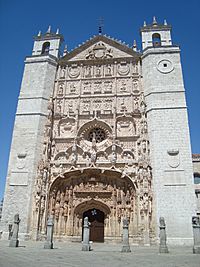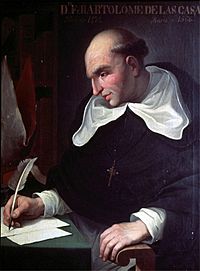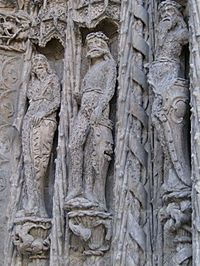Valladolid debate facts for kids

The Valladolid debate (1550–1551) was the first moral debate in European history to discuss the rights and treatment of an indigenous people by European colonizers. Held in the Colegio de San Gregorio, in the Spanish city of Valladolid, it was a moral and theological debate about the conquest of the Americas, its justification for the conversion to Catholicism, and more specifically about the relations between the European settlers and the natives of the New World. It consisted of a number of opposing views about the way natives were to be integrated into Spanish society, their conversion to Catholicism, and their rights.
A controversial theologian, Dominican friar and Bishop of Chiapas Bartolomé de las Casas, argued that the Amerindians were free men in the natural order despite their practice of human sacrifices and other such customs, deserving the same consideration as the colonizers. Opposing this view were a number of scholars and priests, including humanist scholar Juan Ginés de Sepúlveda, who argued that the human sacrifice and other such "crimes against nature" were unacceptable and should be suppressed by any means possible including war.
Although both sides claimed to have won the disputation, there is no clear record supporting either interpretation. The affair is considered one of the earliest examples of moral debates about colonialism, human rights of colonized peoples, and international relations. In Spain, it served to establish Las Casas as the primary, though controversial defender of the Indians. He and others had contributed to the passing of the New Laws of 1542, which limited the encomienda system further. Though they did not fully reverse the situation, the laws achieved considerable improvement in the treatment of Indians and consolidated their rights granted by earlier laws.
Background

Spain's colonization and conquest of the Americas inspired an intellectual debate especially regarding the compulsory Christianization of the Indians. Bartolomé de las Casas, a Dominican friar from the School of Salamanca and member of the growing Christian Humanist movement, worked for years to oppose forced conversions and to expose the treatment of natives in the encomiendas. His efforts influenced the papal bull Sublimis Deus of 1537 which established the status of the Indians as rational beings. More significantly, Las Casas was instrumental in the passage of the New Laws (the Laws of the Indies) of 1542, which were designed to end the encomienda system.
Moved by Las Casas and others, in 1550 the King of Spain Charles I ordered further military expansion to cease until the issue was investigated. The King assembled a Junta (Jury) of eminent doctors and theologians to hear both sides and to issue a ruling on the controversy. Las Casas represented one side of the debate. His position found some support from the monarchy, which wanted to control the power of the encomenderos. Representing the other side was Juan Ginés de Sepúlveda, whose arguments were used as support by colonists and landowners who benefited from the system.
Images for kids
See also
 In Spanish: Junta de Valladolid para niños
In Spanish: Junta de Valladolid para niños
- Catholic Church and the Age of Discovery
- Sublimis Deus



